17 aug 2015
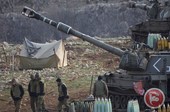
Israeli military vehicles entered agricultural lands in a border area in southern Gaza on Monday, local residents said.
Witnesses told Ma'an that five Israeli excavators raided the al-Nahda neighborhood near Rafah and leveled Palestinian land.
Israeli reconnaissance planes flew overhead during the operation, with Israeli military tanks positioned on the border between Gaza and Israel.
Israeli forces frequently shoot at farmers and other civilians inside the Gaza Strip if they approach large swathes of land near the border that the Israeli military has deemed off-limits to Palestinians.
The "security buffer zone" extends between 500 meters and 1500 meters into the Strip, effectively turning local farms into no-go zones. According to UNOCHA, 17 percent of Gaza's total land area and 35 percent of its agricultural land were within the buffer zone as of 2010, directly affecting the lives and livelihoods of more than 100,000 Gazans.
Witnesses told Ma'an that five Israeli excavators raided the al-Nahda neighborhood near Rafah and leveled Palestinian land.
Israeli reconnaissance planes flew overhead during the operation, with Israeli military tanks positioned on the border between Gaza and Israel.
Israeli forces frequently shoot at farmers and other civilians inside the Gaza Strip if they approach large swathes of land near the border that the Israeli military has deemed off-limits to Palestinians.
The "security buffer zone" extends between 500 meters and 1500 meters into the Strip, effectively turning local farms into no-go zones. According to UNOCHA, 17 percent of Gaza's total land area and 35 percent of its agricultural land were within the buffer zone as of 2010, directly affecting the lives and livelihoods of more than 100,000 Gazans.
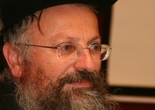
The Israeli occupation army on Sunday night launched a large-scale search for a missing soldier along the eastern border of Khan Younis in southern Gaza following a hoax report on his capture by the Palestinian resistance.
Local sources said that the Israeli army sent large reinforcements to the eastern border areas of Khan Younis, where they carried out a limited incursion to look for the soldier.
The sources added the troops fired more than 20 flare bombs during the search operation.
Israeli media sources, in turn, claimed that the intensive military moves on Gaza border happened after the Israeli army received a report on the kidnapping of a soldier from Sofa post, east of Rafah.
They added that the search operation was aborted after finding out that the kidnap report was untrue.
Local sources said that the Israeli army sent large reinforcements to the eastern border areas of Khan Younis, where they carried out a limited incursion to look for the soldier.
The sources added the troops fired more than 20 flare bombs during the search operation.
Israeli media sources, in turn, claimed that the intensive military moves on Gaza border happened after the Israeli army received a report on the kidnapping of a soldier from Sofa post, east of Rafah.
They added that the search operation was aborted after finding out that the kidnap report was untrue.
16 aug 2015

Actress Penelope Cruz and her husband Javier Bardem have roused the fury of Hollywood producers, with pledges made to snub the Spanish couple.
Oscar-winner Bardem and Cruz signed an open letter speaking against “the genocide perpetrated by the Israeli occupation army”.
According to IB Times/Days of Palestine, the letter accused the Israeli occupation of “advancing on Palestinian territories instead of withdrawing to the 1967 borders.
“Gaza is living through horror… while the international community does nothing.”
The Spanish letter was signed by 100 leading figures in the film industry, including director Pedro Almodovar.
One top producer who has worked with Cruz says he privately has vowed not to hire her again, according to the Hollywood Reporter.
Another top Hollywood executive also privately expressed his disapproval, saying he is “furious at Javier and Penelope” and was not sure about working with the Spanish couple again.
Hollywood big names have waded into the controversy, including comedian Joan Rivers. When quizzed by a TMZ reporter on her thoughts about the 2,000 Palestinians who have so far been killed, she said: “Oh my God! Tell that to the people in Hiroshima.
“Good. Good. When you declare war, you declare war. They started it. We now do not count who is dead. You are dead, you deserve to be dead. Do not you dare make me feel bad about that.
“They were told to get out. They did not get out. You do not get out, you are an idiot. At least the ones that were killed were the ones with low IQs.”
Oscar-winner Bardem and Cruz signed an open letter speaking against “the genocide perpetrated by the Israeli occupation army”.
According to IB Times/Days of Palestine, the letter accused the Israeli occupation of “advancing on Palestinian territories instead of withdrawing to the 1967 borders.
“Gaza is living through horror… while the international community does nothing.”
The Spanish letter was signed by 100 leading figures in the film industry, including director Pedro Almodovar.
One top producer who has worked with Cruz says he privately has vowed not to hire her again, according to the Hollywood Reporter.
Another top Hollywood executive also privately expressed his disapproval, saying he is “furious at Javier and Penelope” and was not sure about working with the Spanish couple again.
Hollywood big names have waded into the controversy, including comedian Joan Rivers. When quizzed by a TMZ reporter on her thoughts about the 2,000 Palestinians who have so far been killed, she said: “Oh my God! Tell that to the people in Hiroshima.
“Good. Good. When you declare war, you declare war. They started it. We now do not count who is dead. You are dead, you deserve to be dead. Do not you dare make me feel bad about that.
“They were told to get out. They did not get out. You do not get out, you are an idiot. At least the ones that were killed were the ones with low IQs.”

The Israeli occupation army on Sunday morning opened heavy machine gunfire at Palestinian farmers in the blockaded Gaza Strip, in a renewed violation of the ceasefire deal struck last summer.
A field observer working for the Quds Press said the Israeli occupation soldiers deployed at military sites and jeeps in eastern Rafah, to the south of Gaza, attacked Palestinian farmers and civilian homes with heavy spates of machine gunfire.
The Israeli army troops raked through the border fence while drones were hovering overheads, the same source further reported.
The attack is another chain in the series of Israeli violations of the Cairo-brokered ceasefire accord signed with Palestinian resistance factions on August 26.
An Israeli offensive on the blockaded Gaza Strip last summer took away the lives of at least 2,300 Palestinians, mostly civilian children and women, and left over 11,000 others wounded.
A field observer working for the Quds Press said the Israeli occupation soldiers deployed at military sites and jeeps in eastern Rafah, to the south of Gaza, attacked Palestinian farmers and civilian homes with heavy spates of machine gunfire.
The Israeli army troops raked through the border fence while drones were hovering overheads, the same source further reported.
The attack is another chain in the series of Israeli violations of the Cairo-brokered ceasefire accord signed with Palestinian resistance factions on August 26.
An Israeli offensive on the blockaded Gaza Strip last summer took away the lives of at least 2,300 Palestinians, mostly civilian children and women, and left over 11,000 others wounded.
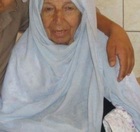
Amina Abu Naqira 77
A Palestinian woman from Rafah city in the southern Gaza Strip died Sunday morning from wounds she sustained more than a week ago when an unexploded ordnance from last summer's Israeli military offensive went off while a family was clearing rubble from a destroyed house in the Shabora neighborhood of Rafah.
Palestinian medical sources at Abu Yousif al-Najjar hospital in Rafah said 77-year-old Amina Abu Naqira was in a critical condition before she succumbed to her wounds on Sunday morning after fighting for life for more than one week.
At least four Palestinians were killed the day of the explosion, and over 30 were injured. The other fatalities were all from the same family as the 77-year-old and were identified earlier this month as Bakr Hasan Abu Naqira, Abdul-Rahman Abu Naqira, Ahmad Hasan Abu Naqira, and Hassan Ahmad Abu Naqira.
Over 7,000 unexploded ordnance were left throughout the Gaza Strip following last summer's war between Israel and Palestinian militant groups, according to officials of the UN Humanitarian Coordinator for the Palestinian territories (OCHA).
Even before the most frequent Israeli assault, unexploded ordnance from the 2008-9 and 2012 offensives were a major threat to Gazans. A 2012 report published by the Office of the High Commissioner for Human Rights said that 111 civilians, 64 of whom were children, were casualties to unexploded ordnance between 2009 and 2012, reaching an average of four every month in 2012.
A Palestinian woman from Rafah city in the southern Gaza Strip died Sunday morning from wounds she sustained more than a week ago when an unexploded ordnance from last summer's Israeli military offensive went off while a family was clearing rubble from a destroyed house in the Shabora neighborhood of Rafah.
Palestinian medical sources at Abu Yousif al-Najjar hospital in Rafah said 77-year-old Amina Abu Naqira was in a critical condition before she succumbed to her wounds on Sunday morning after fighting for life for more than one week.
At least four Palestinians were killed the day of the explosion, and over 30 were injured. The other fatalities were all from the same family as the 77-year-old and were identified earlier this month as Bakr Hasan Abu Naqira, Abdul-Rahman Abu Naqira, Ahmad Hasan Abu Naqira, and Hassan Ahmad Abu Naqira.
Over 7,000 unexploded ordnance were left throughout the Gaza Strip following last summer's war between Israel and Palestinian militant groups, according to officials of the UN Humanitarian Coordinator for the Palestinian territories (OCHA).
Even before the most frequent Israeli assault, unexploded ordnance from the 2008-9 and 2012 offensives were a major threat to Gazans. A 2012 report published by the Office of the High Commissioner for Human Rights said that 111 civilians, 64 of whom were children, were casualties to unexploded ordnance between 2009 and 2012, reaching an average of four every month in 2012.
15 aug 2015
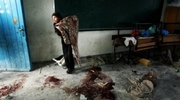
One year ago, on 15 August – 40 days into Israel’s 51 day monstrous assault on Gaza that was clocking up 1800 innocent Palestinian deaths – Adrian Orr, the CEO of the New Zealand Superfund (NZSF) took a cheap shot, a morally cheap low shot, at concerned young protesters who chained themselves in the NZSF office demanding that the NZSF immediately divest from Israel Chemicals (ICL) – a supplier of lethal white phosphorus to the US army for the manufacture of munitions sold back to Israel to barrage fire and death on Gaza.
In response to spokesperson Nadia Abu-Shanab’s passionate urging for divestment, Adrian Orr’s smug retort was: “Do you brush your teeth? ( Nadia: “Sorry?) “Do you brush your teeth? White phosphorus is used in many places.”
Orr is not stupid. Paid 800k NZD per annum, he knows that phosphate is used in toothpaste, whereas the pure evil of white phosphorus, derived from phosphate through an industrial process, is so highly reactive to oxygen it has to be stored under water. Exposed to air, it sears human flesh to the bone, damages the immune system and causes neurological damage.
Search Google images: "white phosphorus burns" (WARNING: extremely graphic content.)
Nadia then goes on to say, “Palestinians have actually identified the company”, and Orr butts in with appalling callous flippancy: “I can identify lots of companies that annoy me in life.”
Annoy? Annoy? Annoyance is not how Mus’ab Almadani’s feels about Israel Chemicals supplying the white phosphorus that seared the innocent flesh of his little son Hamza, 3. The terror and agonising pain has branded horrific physical, emotional and psychological scars on Hamza for life.
Orr admits that Israeli Chemicals (ICL), “sells some to the US defense force, the US defence force then sells some to the Israeli defense force.”
This offhand comment glosses over the evidence that ICL’s white phosphorus is integrated in munitions used in Gaza: “The Army contracting Command – Rock Island (ACC-RI) has awarded contract W52P1J-13-P-3004 for White Phosphorus to ICL Performance Products LP, used for the Ctg 155mm M110A2.”
Notwithstanding, Orr and NZSF have dug in, refusing to exclude Israel Chemicals because they “draw a distinction between a company being directly and materially involved in an activity, versus being a supplier of materials or services in the normal course of business.”
That argument wouldn’t go down well with any drug enforcement agency regarding overseas suppliers exporting pseudo-ephedrine and ephedrine for methamphetamine manufacture.
NZSF is a government body and so Orr is dutifully following NZ government policy that goes easy on Israel’s genocidal assaults on Palestinian families. Prime Minister John Key, on July 22, 2014, two weeks into Gaza’s hell, parroted the stale Israeli propaganda that Israel had ‘the right to defend itself’ [but not Palestinians, not Hamza] in a conflict between two equal sides. Seriously equal??? – high tech Israeli precision munitions against a people, the majority whom are children, cut off by land, sky and sea versus piddling rockets.
Key’s opportunistic reference to “the kidnapping of three Israeli teens on the West Bank in early June” ignobly suggests the Palestinians are to blame. This is boosted by his devious omission that Israel had killed 16 Palestinians, including 4 children, in the West Bank from January to June 2014.
Key’s pro-Israel bias clones the bias of all western democracies and the UN.
Orr terminates the encounter with the protesters with dismissive bureaucratic pragmatism: “We need to get on with business, we heard you, I will be thinking hard about it.”
In his hard thinking Orr must also consider Bank Leumi for divestment. It has an 18% stake in Israel Chemicals.
Orr has had exactly a year to think about it. One hoped in his contemplation he researched Mads Gilbert's "Night in Gaza" or Mohammed Omer’s "Shellshocked" or Atef Abu Saif's "The Drone Eats with Me" or Max Blumenthal's, "The 51 Day War: Ruin and Resistance in Gaza".
On August 3, 2015, sixty principled protesters rallied outside the NZSF building in Auckland to assert that investment in Israel’s barbaric business of death was not to be done in their name.
Orr refused to meet with them. Seems NZSF staff have acquired the knack to sleep easy (deaf to the cries of Palestinian children) while working for a company, on behalf of the pro-Israel NZ government, that invests in Israeli war crimes.
Well, lets pose a challenge to Adrian Orr
Related: 10/25/14 10 O'clock In Jerusalem & All Is Not Well
See also: Federal contract site reveals US reliance on Monsanto and Israeli firm for White Phosphorus supply
In response to spokesperson Nadia Abu-Shanab’s passionate urging for divestment, Adrian Orr’s smug retort was: “Do you brush your teeth? ( Nadia: “Sorry?) “Do you brush your teeth? White phosphorus is used in many places.”
Orr is not stupid. Paid 800k NZD per annum, he knows that phosphate is used in toothpaste, whereas the pure evil of white phosphorus, derived from phosphate through an industrial process, is so highly reactive to oxygen it has to be stored under water. Exposed to air, it sears human flesh to the bone, damages the immune system and causes neurological damage.
Search Google images: "white phosphorus burns" (WARNING: extremely graphic content.)
Nadia then goes on to say, “Palestinians have actually identified the company”, and Orr butts in with appalling callous flippancy: “I can identify lots of companies that annoy me in life.”
Annoy? Annoy? Annoyance is not how Mus’ab Almadani’s feels about Israel Chemicals supplying the white phosphorus that seared the innocent flesh of his little son Hamza, 3. The terror and agonising pain has branded horrific physical, emotional and psychological scars on Hamza for life.
Orr admits that Israeli Chemicals (ICL), “sells some to the US defense force, the US defence force then sells some to the Israeli defense force.”
This offhand comment glosses over the evidence that ICL’s white phosphorus is integrated in munitions used in Gaza: “The Army contracting Command – Rock Island (ACC-RI) has awarded contract W52P1J-13-P-3004 for White Phosphorus to ICL Performance Products LP, used for the Ctg 155mm M110A2.”
Notwithstanding, Orr and NZSF have dug in, refusing to exclude Israel Chemicals because they “draw a distinction between a company being directly and materially involved in an activity, versus being a supplier of materials or services in the normal course of business.”
That argument wouldn’t go down well with any drug enforcement agency regarding overseas suppliers exporting pseudo-ephedrine and ephedrine for methamphetamine manufacture.
NZSF is a government body and so Orr is dutifully following NZ government policy that goes easy on Israel’s genocidal assaults on Palestinian families. Prime Minister John Key, on July 22, 2014, two weeks into Gaza’s hell, parroted the stale Israeli propaganda that Israel had ‘the right to defend itself’ [but not Palestinians, not Hamza] in a conflict between two equal sides. Seriously equal??? – high tech Israeli precision munitions against a people, the majority whom are children, cut off by land, sky and sea versus piddling rockets.
Key’s opportunistic reference to “the kidnapping of three Israeli teens on the West Bank in early June” ignobly suggests the Palestinians are to blame. This is boosted by his devious omission that Israel had killed 16 Palestinians, including 4 children, in the West Bank from January to June 2014.
Key’s pro-Israel bias clones the bias of all western democracies and the UN.
Orr terminates the encounter with the protesters with dismissive bureaucratic pragmatism: “We need to get on with business, we heard you, I will be thinking hard about it.”
In his hard thinking Orr must also consider Bank Leumi for divestment. It has an 18% stake in Israel Chemicals.
Orr has had exactly a year to think about it. One hoped in his contemplation he researched Mads Gilbert's "Night in Gaza" or Mohammed Omer’s "Shellshocked" or Atef Abu Saif's "The Drone Eats with Me" or Max Blumenthal's, "The 51 Day War: Ruin and Resistance in Gaza".
On August 3, 2015, sixty principled protesters rallied outside the NZSF building in Auckland to assert that investment in Israel’s barbaric business of death was not to be done in their name.
Orr refused to meet with them. Seems NZSF staff have acquired the knack to sleep easy (deaf to the cries of Palestinian children) while working for a company, on behalf of the pro-Israel NZ government, that invests in Israeli war crimes.
Well, lets pose a challenge to Adrian Orr
Related: 10/25/14 10 O'clock In Jerusalem & All Is Not Well
See also: Federal contract site reveals US reliance on Monsanto and Israeli firm for White Phosphorus supply
13 aug 2015
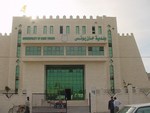
The Coastal Municipalities Water Utility (CMWU) has appealed to Gaza donors to urgently step in and work on assuaging the humanitarian crisis rocking Rafah city and the eastern villages of Khan Younis before it is too late.
CMWU said, in a statement, the water and sanitation services are on the verge of a total breakdown due to the exacerbating electricity crisis in Gaza, itself aggravated by the increasing problems in connecting power from Egypt.
CMWU warned that an outage is very likely to rock water utilities within the next 12 hours and the sanitation facilities within 48 hours.
The department appealed to the donor countries to urgently intervene and work on providing Rafah and the eastern regions of Khan Younis with a minimum of some 6,500 liters of diesel per day so as to provide civilians with the basic water and sanitation facilities and prevent an imminent environmental and humanitarian crisis pending serious work, by the energy authorities, on a more permanent solution.
CMWU said, in a statement, the water and sanitation services are on the verge of a total breakdown due to the exacerbating electricity crisis in Gaza, itself aggravated by the increasing problems in connecting power from Egypt.
CMWU warned that an outage is very likely to rock water utilities within the next 12 hours and the sanitation facilities within 48 hours.
The department appealed to the donor countries to urgently intervene and work on providing Rafah and the eastern regions of Khan Younis with a minimum of some 6,500 liters of diesel per day so as to provide civilians with the basic water and sanitation facilities and prevent an imminent environmental and humanitarian crisis pending serious work, by the energy authorities, on a more permanent solution.
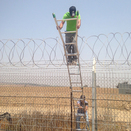
Fences around Gaza-adjacent communities can now automatically detect possible infiltrations and instantly alert troops, as concerns rise over Hamas attack tunnels; drill checks effectiveness.
Israel has installed new "smart" fences around Gaza-adjacent communities in the wake of Operation Protective Edge, featuring the ability to recognize suspicious activity and send troops to the scene in seconds.
Reports have surfaced in recent days, both from Israeli and Palestinian sources, that Hamas has accelerated its construction of hidden attack tunnels. On Tuesday, Ibrahim Adel Shehadeh Shaer, a Hamas operative in Israeli custody, told the Shin Bet of the organization's plans to use tunnels in a future conflict. Hamas also claimed on Wednesday that it had captured an Israeli drone and made it operational.
Gaza-adjacent communities have been preparing for another round of escalation. Since the end of last year's conflict, residents received a new "protection package" suited to the threats they faced during Operation Protective Edge.
New smart fences have been built and made operational around communities that lacked them. The smart fence permits immediate detection of infiltrations, triggering deployment of the community's security coordinator and military units stationed in the area.
Eyal Hajbi, chief security officer for Sha'ar Hanegev Regional Council, observed the fence construction over the last few weeks. "Currently all the fences surrounding the communities have been upgraded, and lighting and technological measures have been installed to complete the defenses," he said.
"This was a mission we worked on in cooperation with the Home Front Command and the Southern Command," added Hajbi. "It's a project in which a large amount of funds was invested, and all parties banded together in order to advance it and reach the point we're at now."
Israel has installed new "smart" fences around Gaza-adjacent communities in the wake of Operation Protective Edge, featuring the ability to recognize suspicious activity and send troops to the scene in seconds.
Reports have surfaced in recent days, both from Israeli and Palestinian sources, that Hamas has accelerated its construction of hidden attack tunnels. On Tuesday, Ibrahim Adel Shehadeh Shaer, a Hamas operative in Israeli custody, told the Shin Bet of the organization's plans to use tunnels in a future conflict. Hamas also claimed on Wednesday that it had captured an Israeli drone and made it operational.
Gaza-adjacent communities have been preparing for another round of escalation. Since the end of last year's conflict, residents received a new "protection package" suited to the threats they faced during Operation Protective Edge.
New smart fences have been built and made operational around communities that lacked them. The smart fence permits immediate detection of infiltrations, triggering deployment of the community's security coordinator and military units stationed in the area.
Eyal Hajbi, chief security officer for Sha'ar Hanegev Regional Council, observed the fence construction over the last few weeks. "Currently all the fences surrounding the communities have been upgraded, and lighting and technological measures have been installed to complete the defenses," he said.
"This was a mission we worked on in cooperation with the Home Front Command and the Southern Command," added Hajbi. "It's a project in which a large amount of funds was invested, and all parties banded together in order to advance it and reach the point we're at now."
12 aug 2015
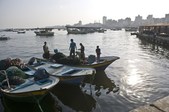
Israeli naval forces opened fire on Palestinian fishermen off the coast of Gaza City early Wednesday, witnesses said.
The fishermen said that they came under fire as they were sailing off the coast of Sudaniyya in northwestern Gaza City. No injuries were reported, but some of the boats were hit with gunshots, causing the fishermen to return to shore.
Israeli forces have repeatedly opened fire on Palestinian fisherman and farmers since the ceasefire agreement signed Aug. 26, 2014 that ended a devastating 50-day Israeli military offensive against the Gaza Strip.
In many cases there were casualties. The attacks come despite Israeli promises at the end of the ceasefire to ease restrictions on Palestinian access to both the sea and the border region near the "security buffer zone."
Palestinian fishermen face daily risks in order to make a living, including routine harassment from Israeli naval forces, confiscation of boats and materials, detention, and potentially death.
At least three Palestinian fishermen have been shot dead by Israeli forces since last September. Israeli forces often allege that fishermen deviate from the designated fishing zone and pose a security threat.
Israel promised last year to extend the fishing zone to six nautical miles as part of the ceasefire that ended last summer's devastating Gaza war. However, the zone's exact limits remain ambiguous and rights groups say Israeli authorities have not respected the agreement.
The fishermen said that they came under fire as they were sailing off the coast of Sudaniyya in northwestern Gaza City. No injuries were reported, but some of the boats were hit with gunshots, causing the fishermen to return to shore.
Israeli forces have repeatedly opened fire on Palestinian fisherman and farmers since the ceasefire agreement signed Aug. 26, 2014 that ended a devastating 50-day Israeli military offensive against the Gaza Strip.
In many cases there were casualties. The attacks come despite Israeli promises at the end of the ceasefire to ease restrictions on Palestinian access to both the sea and the border region near the "security buffer zone."
Palestinian fishermen face daily risks in order to make a living, including routine harassment from Israeli naval forces, confiscation of boats and materials, detention, and potentially death.
At least three Palestinian fishermen have been shot dead by Israeli forces since last September. Israeli forces often allege that fishermen deviate from the designated fishing zone and pose a security threat.
Israel promised last year to extend the fishing zone to six nautical miles as part of the ceasefire that ended last summer's devastating Gaza war. However, the zone's exact limits remain ambiguous and rights groups say Israeli authorities have not respected the agreement.
11 aug 2015
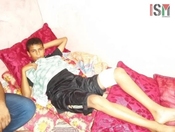
Maher Shitat, 13 years old, was shot in the leg on Friday night (8 aug) by the occupation forces.
His father sent him to bring his brother from a relative’s home and on the way there the soldiers shot him without previous advice. He was shot in El Zeraa area, in Beit Hanoun, at 8pm. He was walking at 500m from the fence when he was shot, on a frequently used road.
He was first taken to Beit Hanoun Hospital, where due to the lack of medical equipment the doctors where unable to treat him. After that he was transferred to Kamal Adwan Hospital, where the doctors decided not to remove the bullet, as they said it’s located very near to a vein, and removing it would most probably end up with his leg amputated.
Now they are trying to stabilize his condition. After a while they hope he will be able to walk again, and after 15 years, when his leg and veins are stronger, they’ll try to remove the bullet.
For the moment Maher is not allowed to walk, so he spends his days lying on a mattress.
His mother explains: “he is very afraid… he doesn’t want to speak and today spent more than 30 minutes just shaking.”
Maher on the matress in is his home.
But as his family says, that’s not just because of this attack. During the last aggression his home was bombed, his cousin was killed and his father was injured in the leg.
Maher’s father’s scarred leg.
They were not at home when it was bombed, they were already at the UNRWA shelter/school, but they were at home when the one next to theirs was bombed. Since that day Maher’s family says that his personality has changed. They think he has a trauma. In his short life Maher has already suffered 3 massive Zionist aggressions against the Gaza Strip.
Her mother explains that since the last massacre, and until now, he can’t go alone to the bathroom, as he is afraid the zionist soldiers will be inside.
She also explains how Maher and his brothers ask her all the time why the Israelis want to kill them, and that they keep crying because they don’t want to die.
The psychological effect of those aggressions are obvious on Maher, as on most of Gaza’s children, before the last massacre he had always been one of the first in his class, but this year he had very bad results in his exams and will have to repeat the course.
His father sent him to bring his brother from a relative’s home and on the way there the soldiers shot him without previous advice. He was shot in El Zeraa area, in Beit Hanoun, at 8pm. He was walking at 500m from the fence when he was shot, on a frequently used road.
He was first taken to Beit Hanoun Hospital, where due to the lack of medical equipment the doctors where unable to treat him. After that he was transferred to Kamal Adwan Hospital, where the doctors decided not to remove the bullet, as they said it’s located very near to a vein, and removing it would most probably end up with his leg amputated.
Now they are trying to stabilize his condition. After a while they hope he will be able to walk again, and after 15 years, when his leg and veins are stronger, they’ll try to remove the bullet.
For the moment Maher is not allowed to walk, so he spends his days lying on a mattress.
His mother explains: “he is very afraid… he doesn’t want to speak and today spent more than 30 minutes just shaking.”
Maher on the matress in is his home.
But as his family says, that’s not just because of this attack. During the last aggression his home was bombed, his cousin was killed and his father was injured in the leg.
Maher’s father’s scarred leg.
They were not at home when it was bombed, they were already at the UNRWA shelter/school, but they were at home when the one next to theirs was bombed. Since that day Maher’s family says that his personality has changed. They think he has a trauma. In his short life Maher has already suffered 3 massive Zionist aggressions against the Gaza Strip.
Her mother explains that since the last massacre, and until now, he can’t go alone to the bathroom, as he is afraid the zionist soldiers will be inside.
She also explains how Maher and his brothers ask her all the time why the Israelis want to kill them, and that they keep crying because they don’t want to die.
The psychological effect of those aggressions are obvious on Maher, as on most of Gaza’s children, before the last massacre he had always been one of the first in his class, but this year he had very bad results in his exams and will have to repeat the course.
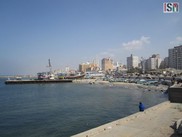
Two days ago, on Sunday’s night at 3am, the occupation forces kidnapped fishermen Mohamed Ismail Sharafi, 34 years old, and Mohamed Saidi, 22 years old, in Gaza City waters.
According to the testimony of the other fishermen that where working with them the night of the attack, around 10 boats, one of the two fishermen was injured by live ammunition before being kidnapped.
The aggression took place at 5 miles off shore and their boat was also taken to Ashdod.
Two weeks ago Ahmed Sharafi, Mohamed’s brother, was shot in his back with live ammunition while working with his father.
Since the end of the last Zionist massacre against Gaza there have been 1312 reported attacks against the fishermen.
Since then, 22 boats have been stolen; 26 fishermen have been injured; one fisherman, Tawfiq Abu Riela, has been assassinated; 28 boats have been disabled by bullet fire; 2 big fishing boats have been sunken by rocket fire, one in Deir El Balah at 300m from the coast and one in Gaza City at 5 miles; 51 fishermen have been kidnapped while working and 3 fishermen remain prisoners until now.
Those facts, among other practices of the occupation forces, have caused the quantity of fish caught to decrease from 1600 tons the year before the massacre to 1000 tons the year after. At the same time the number of fishermen who work in the Gaza Strip has decreased from 3000 to 1000 and the fishermen who keep working have seen how their monthly income decreased from 2000 ILS to the actual 100 ILS.
This last year, just in Beach Camp, 50 children of fishermen have left the school in order to work carrying flour sacks at the doors of UNRWA for 1 ILS each sack.
It’s becoming something common that the fishermen families have to choose between their children and decide which ones will go to school and which ones will have to work in order to support the family.
In this moment there are 900 children of fishermen in Gaza City, and 1700 in all the Strip, that should start the academic year in 20 days and whose parents can’t afford to buy them the school materials.
According to the testimony of the other fishermen that where working with them the night of the attack, around 10 boats, one of the two fishermen was injured by live ammunition before being kidnapped.
The aggression took place at 5 miles off shore and their boat was also taken to Ashdod.
Two weeks ago Ahmed Sharafi, Mohamed’s brother, was shot in his back with live ammunition while working with his father.
Since the end of the last Zionist massacre against Gaza there have been 1312 reported attacks against the fishermen.
Since then, 22 boats have been stolen; 26 fishermen have been injured; one fisherman, Tawfiq Abu Riela, has been assassinated; 28 boats have been disabled by bullet fire; 2 big fishing boats have been sunken by rocket fire, one in Deir El Balah at 300m from the coast and one in Gaza City at 5 miles; 51 fishermen have been kidnapped while working and 3 fishermen remain prisoners until now.
Those facts, among other practices of the occupation forces, have caused the quantity of fish caught to decrease from 1600 tons the year before the massacre to 1000 tons the year after. At the same time the number of fishermen who work in the Gaza Strip has decreased from 3000 to 1000 and the fishermen who keep working have seen how their monthly income decreased from 2000 ILS to the actual 100 ILS.
This last year, just in Beach Camp, 50 children of fishermen have left the school in order to work carrying flour sacks at the doors of UNRWA for 1 ILS each sack.
It’s becoming something common that the fishermen families have to choose between their children and decide which ones will go to school and which ones will have to work in order to support the family.
In this moment there are 900 children of fishermen in Gaza City, and 1700 in all the Strip, that should start the academic year in 20 days and whose parents can’t afford to buy them the school materials.
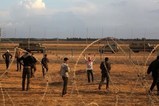
The Israeli Occupation Forces (IOF) opened their machine gun fire towards three Palestinian youths near the border fence east of Deir al-Balah in Gaza Strip on Monday night. No causalities were reported during the armed attack.
The shooting was accompanied with heavy flight of Israeli aircraft over the area, while Israeli troops intensified movement along the border fence, the PIC reporter said. No injuries or arrests were reported.
Meanwhile, IOF fired live rounds and firebombs towards Palestinian agricultural lands in the Central Province in Gaza Strip.
Israeli military sources claimed that firebombs were fired near their military sites along the eastern border areas.
Palestinian farmers in Gaza are subjected to almost daily shootings at the hands of Israeli forces stationed along the border fence in an attempt to prevent their agricultural work.
In the West Bank, the IOF soldiers arrested Monday evening a Palestinian boy after severely beating him along with a group of boys in Takoa town in Bethlehem.
Locals told a PIC reporter that Israeli forces violently attacked the boys for allegedly being involved in stone-throwing attack against settlers’ vehicles.
One of the boys was arrested during the attack, the sources added.
The shooting was accompanied with heavy flight of Israeli aircraft over the area, while Israeli troops intensified movement along the border fence, the PIC reporter said. No injuries or arrests were reported.
Meanwhile, IOF fired live rounds and firebombs towards Palestinian agricultural lands in the Central Province in Gaza Strip.
Israeli military sources claimed that firebombs were fired near their military sites along the eastern border areas.
Palestinian farmers in Gaza are subjected to almost daily shootings at the hands of Israeli forces stationed along the border fence in an attempt to prevent their agricultural work.
In the West Bank, the IOF soldiers arrested Monday evening a Palestinian boy after severely beating him along with a group of boys in Takoa town in Bethlehem.
Locals told a PIC reporter that Israeli forces violently attacked the boys for allegedly being involved in stone-throwing attack against settlers’ vehicles.
One of the boys was arrested during the attack, the sources added.
10 aug 2015
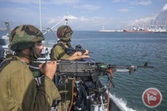
Israeli naval forces on Monday morning, detained two Palestinian fishermen off the coast of Gaza City, the secretary-general of Gaza's fishing union said.
Amjad al-Shirafi told Ma'an that the fishermen were identified as Muhammad al-Shirafi and Muhammad al-Saedi.
He said that Israeli gunboats approached their fishing boats while they were sailing within the six nautical mile fishing zone.
An Israeli army spokeswoman said she was "looking into the incident".
Palestinian fishermen face daily risks in order to make a living, including routine harassment from Israeli naval forces, confiscation of boats and materials, detention, and potentially death.
At least three Palestinian fishermen have been shot dead by Israeli forces since last September.
Israeli forces often allege that fishermen deviate from the designated fishing zone and pose a security threat. Israel promised last year to extend the fishing zone to six nautical miles as part of the ceasefire that ended last summer's devastating Gaza war.
However, the zone's exact limits remain ambiguous and rights groups say Israeli authorities have not respected the agreement.
Amjad al-Shirafi told Ma'an that the fishermen were identified as Muhammad al-Shirafi and Muhammad al-Saedi.
He said that Israeli gunboats approached their fishing boats while they were sailing within the six nautical mile fishing zone.
An Israeli army spokeswoman said she was "looking into the incident".
Palestinian fishermen face daily risks in order to make a living, including routine harassment from Israeli naval forces, confiscation of boats and materials, detention, and potentially death.
At least three Palestinian fishermen have been shot dead by Israeli forces since last September.
Israeli forces often allege that fishermen deviate from the designated fishing zone and pose a security threat. Israel promised last year to extend the fishing zone to six nautical miles as part of the ceasefire that ended last summer's devastating Gaza war.
However, the zone's exact limits remain ambiguous and rights groups say Israeli authorities have not respected the agreement.
Truce violations List of names Pictures of martyrs
Days: Aug: 26 - 25 - 24 - 23 - 22 - 21 - 20 - 19 - 18 - 17 - 16 - 15 - 14 - 13 - 12 - 11 - 10 - 9 - 8 - 7 - 6 - 5 - 4 - 3 - 2 - 1
July: 31 - 30 - 29 - 28 - 27 - 26 - 25 - 24 - 23 - 22 - 21 - 20 - 19 - 18 - 17 - 16 - 15 - 14 - 13 - 12 - 11 - 10 - 9 - 8
